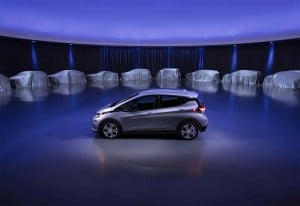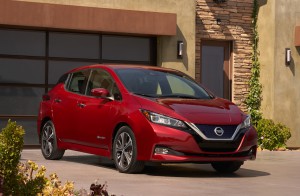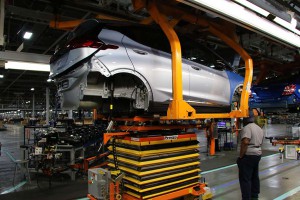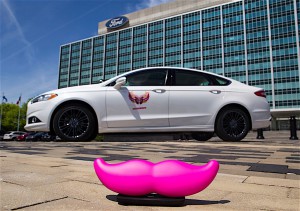
While battery-based vehicles still account for only a miniscule share of the global automotive market, a new study forecasts explosive growth over the coming decade or so, with as much as half of the vehicles sold in the U.S. by 2030 expected to be using some form of electrification.
In the relative near-term, government incentives, including the $7,500 federal tax credit offered in the U.S., will be needed to build momentum, said Xavier Mosquet, the lead author of the study for the Boston Consulting Group. But as battery prices fall and range increases, the technology will become increasingly attractive to consumers without government assistance, he said.

“We see an economically sustainable market for electric vehicles somewhere between 2025 and 2030,” said Mosquet, who heads BCG’s Detroit office. And the faster battery prices fall – and the more oil costs rise – the more the equation shifts from the internal combustion engine to electrified vehicles.
(Why did Tesla take such a tumble during the third quarter? Click Here for the inside story.)
The anticipated surge in sales of battery-based vehicles will reshape the automotive market worldwide, according to the new study, though the mix of technologies will vary from one country to the next. Pure battery-electric vehicles, or BEVs, will gain more traction in places were electricity is cheap and motorists tend to clock lots of miles each year – notably China and the U.S.

Another factor will be the shift from private car ownership to ride-sharing services like Uber, a major transformation many studies foresee occurring in the States, especially once fully driverless vehicles come to market. Since ride-sharing vehicles are likely to run 24/7 and clock perhaps 100,000 miles a year or more, they’ll be more likely to go full electric.
In the U.S., BCG anticipates that 20% of the new vehicle market will be made up of BEVs, about half of those operated by Uber, Lyft or some other ride-sharing service. About 2% of the market will be made up of plug-in hybrids, or PHEVs, while conventional hybrids and so-called microhybrids will account for another 28%. Gas and diesel vehicles will make up the rest of the market.
China will also see a big surge in demand for BEVs, as well as PHEVs. But in Japan and many other global markets, where motorists clock fewer miles each year, the big burst of sales will be in the hybrid segments, if the BCG study is on target.
The study makes some relatively conservative assumptions. For one thing, if oil prices were to jump from $60 to $90 a barrel the demand for electrified vehicles would jump another 3 percentage points.
And demand could surge even more sharply if battery prices fall faster than anticipated – which Mosquet acknowledged is quite possible. When BCG did its previous electrification study in 2010 the price of lithium-ion battery technology was around $670 per kilowatt-hour. Today, that’s as low as $150 – even as batteries have become more energy dense, quicker to charge and more reliable. Within about five years, however, BCG forecasts a price of around $70 a kWh. To put that into perspective, the batteries in the Chevrolet Bolt EV would have cost around $40,000 in 2010 but will drop to around $4,000 by the early 2020s, by BCG’s account.

And several breakthroughs now appear on the horizon, notably the solid-state batteries Toyota plans to use in an all-new line of BEVs to go into production in 2021. That technology could drop prices to as little as $60 per kWh and bring charging times down to minutes, rather than hours.
With significantly lower operating costs, battery vehicles will become more and more cost-competitive on an overall basis by the mid- to late-2020s, predicted the BCG study. The challenge will be to continue building demand in the meantime. And that will require continued subsidies by automotive manufacturers, as well as government incentives.
Government support has been growing in many parts of the world, even as a number of countries move to limit or even ban the sale of vehicles using internal combustion engines. Outright bans have already been enacted by Norway and India and the UK, France, Germany and China – as well as a number of cities like Paris – are considering similar mandates.
(Automakers want vehicle-to-vehicle communications, so why did Pres. Trump move to kill the mandate? Click Here for the latest.)
The U.S. was one of the first to offer financial assistance to buyers of qualified electric vehicles, a full BEV eligible for as much as a $7,500 federal tax credit, along with the incentives available in California and a number of other states.
But under the new tax cut measure outlined by the Republicans today the federal credit would be dropped, a move BCG’s Mosquet calls “a mistake (that) will have a significant impact,” slowing adoption of clean battery technology.

Worse, he said such a move would actually put U.S. automakers including Tesla, as well as General Motors, Ford and Fiat Chrysler, at a competitive disadvantage with foreign makers whose home markets continue to offer such incentives.
The Trump Administration is also considering cuts to the Corporate Average Fuel Economy mandate, something that had been expected to promote the adoption of battery-based technology as the 54.5 mpg target set for 2025 phases in.
But Mosquet said that such a move by the White House might prove irrelevant as California will continue to require strict compliance to its even tougher clean air mandates. And automakers are likely to continue to design future vehicles sold everywhere in the U.S. to meet those targets since 11 other states now have decided to adopt the tougher California rules.
Beyond U.S. borders, meanwhile, the trend to electrify is likely only to accelerate, BCG predicts.
(Germany’s new government wants even greener cars on the road. Click Here for more.)








Lots of silly claims abounding. Estimating the percentage of EVs in a given future year is a total waste of time, since no one can predict the cost of batteries – recharges are fast enough and lifespans are long enough at this point, but likely will improve still further.
Tesla should be jumping for joy that the tax credits are going away – they would have had to face strong competition from automakers who had al of their 200,000 tax credit units and would have enjoyed a $7500 price advantage over Tesla cars. I half expected Elon Musk to argue that tax credits were no longer needed- especially
for wee-to-do buyers of $70,000 plus Tesla cars.